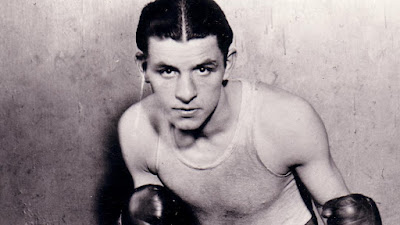A courageous man, Ovadia Hochman possessed an independent streak. As an amateur boxer in prepubescent Israel during the 1950s and early 1960s, he blended unmistakable talent with the occasional lapse in judgement. Hochman later reinvented himself, assuming a new name and new disposition in a new land.
*****
Reuven Hochman and his wife Chava lived in David-Horodok, a shtetl located in Poland during the interwar period but now part of Belarus. Reuven was a teacher at Tarbus, a well-regarded school in town. Reuven and Chava, both from big families, would eventually have a total of ten children of their own. Tragically, they lost three of them while in David-Horodok.
In 1935, Reuven and Chava made a fateful decision. They moved their family to British Palestine and settled in the Tel Aviv area. Fortunately, several of their siblings had also emigrated by then, but at least two of Chava's brothers did not. In 1941, many of the Jews of David-Horodok were murdered by the Nazis. The rest were rounded up and confined to the town's ghetto. By the following year, virtually all of them had been killed. Ovadia's uncles, Chaim Iche and Aharon, were among the victims.
Ovadia, the youngest of Reuven and Chava's children and nicknamed Oved, was born in 1938. He was no more than four years old when the Nazis murdered his uncles. He was ten when Israel gained independence and immediately had to fight for its survival.
*****
Ovadia Hochman was first mentioned in the Hebrew press for his boxing prowess in 1955, just seven years after Israel's birth. He was a member of the Hapoel club in Tel Aviv, and won numerous local amateur bouts.
On May 21, 1957, Hochman took part in a dual between boxers from London and those from Tel Aviv in London, England. Likely his first international tournament, he was serving in the Israeli army at the time, which must have hindered his boxing training. Hochman's opponent in the dual was Ken Hawkins, one of the best amateur bantamweights in London. Hawkins won the North West London title in 1955 and '56. He reached the semifinals of the London tournament three years in a row, finishing as the runner-up a month before the battle against the Tel Aviv team.

London won the team contest 12-8, not a bad showing for the upstart Israelis who didn't have the same level of experience or training equipment as the Brits. Hochman lost his three-rounder by decision, but it made him a better fighter in the long run. He didn't fight when the Israeli team traveled up north to Manchester two weeks later, however. In 1959, he made the final of the Israeli national amateur championships, coming up short against Yacov Hayt, a talented fighter from Rishon Le-Zion.
In April 1960, Ovadia traveled with a group of Israeli boxers to Adolph Hitler's home country, Austria. Representing the lone Jewish country in the shadow of the Holocaust, he must have experienced indescribable emotions while fighting in two tournaments there.
That same year, a team from Iran traveled to Jaffa, Israel to box in two meets. Hochman took part as 7,000 fans looked on. The Iranians won the first team competition 10-6. A few days later, the Israeli captured revenge with a 9-3 win.
Hochman's career came to an abrupt halt after two incidents. In addition to boxing, Hochman was also a basketball player. He played for Maccabi Tzafon, a now defunct team in the Israeli Basketball League, as it was known at the time. He combined the two sports when he got into a heated argument with a basketball referee in July of 1960. Tensions boiled over, and the referee was no match for the experienced fighter. Hochman knocked him out cold.
The following January, Hochman skipped a boxing tournament in Jaffa without cause. The Hapoel club suspended him as a result. His name left the papers; his career in sports seemingly ended. He found work as a tax clerk.
*****
At some point in the 1960s, Hochman immigrated to the United States. He settled in Detroit, which still has a large community from David-Horodok, his parents' hometown. It's possible he settled in Detroit because he had family there. While in Detroit, he Americanized his named to Edward Hoffman and went by the nickname Eddie.
Hoffman never married and had no children, but he made good in America and owned a big textile business. Sadly, some of his cousins back in Israel weren't so fortunate. It must have been devastating for Eddie to learn that some had been killed in Israel's wars.
A close relative of his who wishes to remain anonymous was shocked to learn of Hoffman's run in with the basketball referee and his suspension from the boxing club. The relative described Hoffman as a fascinating, gentle, and well-mannered man and contended he was not impulsive at all. Eddie was loved by all his family, the relative said. Hoffman even coached young boxers and acted as a mentor to the aspiring fighters. One of the relative's fond memories involves hiking with Hoffman and winding up in Canada.
Clearly, Hoffman had grown as a person during his life. Perhaps the stability of owning a big business and living in the U.S. calmed him. Or maybe the wisdom that comes with the passing of years helped to cool the hot-temper of his youth. In any event, his journey should be remembered.
Eddie Hoffman, née Ovadia Hoffman, died in 1999 at the age of 60.
A note on sources:A special thank you to Janna Zamir, a distant relative of Ovadia. She first brought him to my attention and provided all the non-boxing related information for this article.
Another special thank you to Evgheni Boico, who provided all of the boxing-relative information.
Several articles from
The Jewish Chronicle added context and some specifics to Hochman's trip to London.







